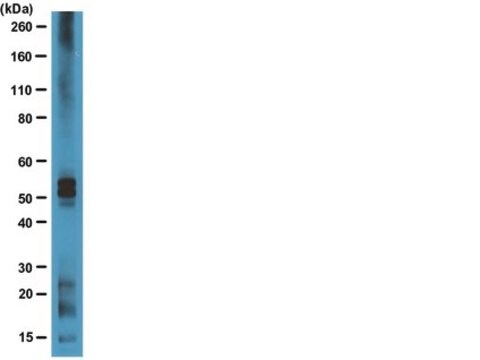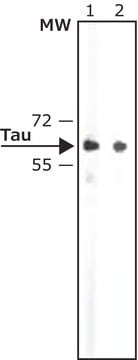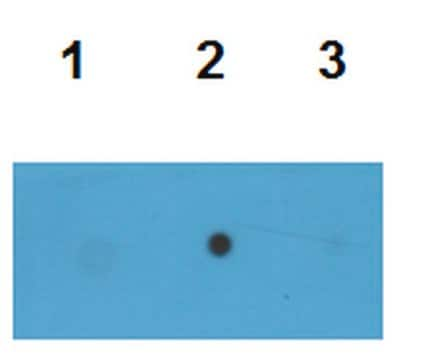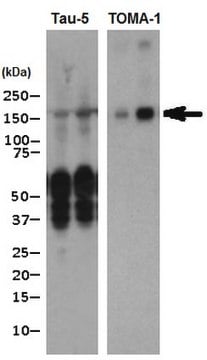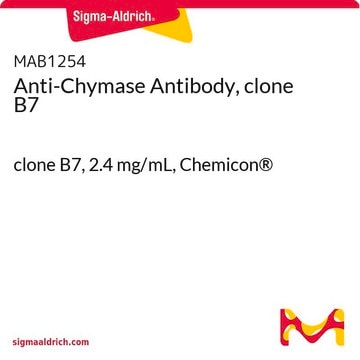추천 제품
생물학적 소스
mouse
Quality Level
항체 형태
culture supernatant
항체 생산 유형
primary antibodies
클론
1E1/A6, monoclonal
종 반응성
mouse, bovine, human, rat
제조업체/상표
Upstate®
기술
immunohistochemistry: suitable
western blot: suitable
동형
IgG
NCBI 수납 번호
UniProt 수납 번호
배송 상태
wet ice
타겟 번역 후 변형
unmodified
유전자 정보
human ... MAPT(4137)
mouse ... Mapt(17762) , Mapt(281296)
rat ... Mapt(29477)
일반 설명
Microtubule Associated Proteins, or MAPS, bind to the tubulin subunits of microtubule structures and regulate their functional stability. In the cell MAPs bind to monomer and multimerized tubulin. MAP binding to multimerized tubulin further stabilizes the formation of higher order microtubulin structures. MAP binding to microtubule structures is mediated through phosporylation through Microtubule Affinity Regulated Kinase (MARK). Phosphorylation releases MAPs bound to microtubules, destabilizing the structure, driving it toward disassembly. There are predominately two MAP types, I, II. Type II MAP includes MAP2, MAP4, and tau and are found in nervous tissue. Six tau isoforms exist in brain tissue, and they are distinguished by their number of binding domains. Three isoforms have three binding domains and the other three have four binding domains. The binding domains are located in the carboxy-terminus of the protein and are positively-charged (allowing it to bind to the negatively-charged microtubule). The isoforms with four binding domains are better at stabilizing microtubules than those with three binding domains.
특이성
Cross-reactivity with mouse and bovine expected due to sequence homology.
Recognizes Tau (4-repeat isoform RD4), Mr 45-65 kDa. Higher MW band (68-72 kDa) represents phosphorylated Tau.
면역원
Bovine thyroglobulin-conjugated synthetic peptide corresponding to amino acids 275-291 (VQIINKKLDLSNVQSKC) of human Tau (4-repeat isoform RD4). Region is flanking junction coded by adjacent exons 9 & 11 with the inclusion of exon 10. The immunizing sequence is identical in human, rat, mouse and bovine.
애플리케이션
Immunohistochemistry:
This antibody has been reported by an independent laboratory to detect Tau (4-repeat isoform RD4) in autoclaved paraffin brain sections. (De Silva, R., 2003;Togo, T., 2002)
Differential Detection of Tauopathies: (Togo, T., 2002)
This antibody has been reported by an independent laboratory to detect Tau (4-repeat isoform RD4) in autoclaved paraffin brain sections. (De Silva, R., 2003;Togo, T., 2002)
Differential Detection of Tauopathies: (Togo, T., 2002)
Research Category
Neuroscience
Neuroscience
Research Sub Category
Kinases & Phosphatases
Neurodegenerative Diseases
Kinases & Phosphatases
Neurodegenerative Diseases
This Anti-Tau (4-repeat isoform RD4) Antibody, clone 1E1/A6 is validated for use in IH, WB for the detection of Tau (4-repeat isoform RD4).
품질
Routinely evaluated by western blot on rat brain cytosol fraction.
Western Blot Analysis:
A 1:1,000-1:10,000 dilution of this lot detected Tau (4-repeat isoform RD4) in a rat brain cytosolic fraction.
Western Blot Analysis:
A 1:1,000-1:10,000 dilution of this lot detected Tau (4-repeat isoform RD4) in a rat brain cytosolic fraction.
표적 설명
~68-72 kDa
물리적 형태
Mouse monoclonal cultured supernatant containing 0.05% sodium azide.
Frozen at -20°C.
Frozen at -20°C.
Unpurified
저장 및 안정성
Stable for 1 year at -20°C from date of receipt.
Handling Recommendations: Upon first thaw, and prior to removing the cap, centrifuge the vial and gently mix the solution. Aliquot into microcentrifuge tubes and store at -20°C. Avoid repeated freeze/thaw cycles, which may damage IgG and affect product performance. Note: Variabillity in freezer temperatures below -20°C may cause glycerol containing solutions to become frozen during storage.
Handling Recommendations: Upon first thaw, and prior to removing the cap, centrifuge the vial and gently mix the solution. Aliquot into microcentrifuge tubes and store at -20°C. Avoid repeated freeze/thaw cycles, which may damage IgG and affect product performance. Note: Variabillity in freezer temperatures below -20°C may cause glycerol containing solutions to become frozen during storage.
분석 메모
Control
Rat brain cytosolic fraction.
Rat brain cytosolic fraction.
기타 정보
Concentration: Please refer to the Certificate of Analysis for the lot-specific concentration.
법적 정보
UPSTATE is a registered trademark of Merck KGaA, Darmstadt, Germany
면책조항
Unless otherwise stated in our catalog or other company documentation accompanying the product(s), our products are intended for research use only and are not to be used for any other purpose, which includes but is not limited to, unauthorized commercial uses, in vitro diagnostic uses, ex vivo or in vivo therapeutic uses or any type of consumption or application to humans or animals.
적합한 제품을 찾을 수 없으신가요?
당사의 제품 선택기 도구.을(를) 시도해 보세요.
Storage Class Code
10 - Combustible liquids
WGK
WGK 2
시험 성적서(COA)
제품의 로트/배치 번호를 입력하여 시험 성적서(COA)을 검색하십시오. 로트 및 배치 번호는 제품 라벨에 있는 ‘로트’ 또는 ‘배치’라는 용어 뒤에서 찾을 수 있습니다.
Pathological inclusion bodies in tauopathies contain distinct complements of tau with three or four microtubule-binding repeat domains as demonstrated by new specific monoclonal antibodies.
de Silva, R, et al.
Neuropathology and Applied Neurobiology, 29, 288-302 (2003)
Pamela McMillan et al.
The Journal of comparative neurology, 511(6), 788-803 (2008-10-18)
Tau is a microtubule-associated protein implicated in neurodegenerative tauopathies. Alternative splicing of the tau gene (MAPT) generates six tau isoforms, distinguishable by the exclusion or inclusion of a repeat region of exon 10, which are referred to as 3-repeat (3R)
Parenchymal and vascular lesions in ageing equine brains: histological and immunohistochemical studies.
M T Capucchio,M Marquez,P Pregel,L Foradada,M Bravo,G Mattutino,C Torre,D Schiffer et al.
Journal of Comparative Pathology null
The complex relationship between soluble and insoluble tau in tauopathies revealed by efficient dephosphorylation and specific antibodies
Hanger, D P, et al
Febs Letters, 531, 538-542 (2002)
The L266V tau mutation is associated with frontotemporal dementia and Pick-like 3R and 4R tauopathy.
Marion Hogg et al.
Acta neuropathologica, 106(4), 323-336 (2003-07-29)
We report a case of rapidly progressive frontotemporal dementia presenting at age 33 years. At autopsy there was severe atrophy of the frontal and temporal lobes. Tau-positive Pick bodies, which ultrastructurally were composed of straight filaments, were present, accompanied by
자사의 과학자팀은 생명 과학, 재료 과학, 화학 합성, 크로마토그래피, 분석 및 기타 많은 영역을 포함한 모든 과학 분야에 경험이 있습니다..
고객지원팀으로 연락바랍니다.
